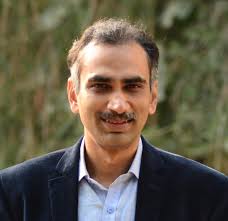Meditative Self-Inquiry with Mukesh Gupta, October 3, 2020
Meditative Self-Inquiry with Mukesh Gupta
Saturday, October 3, 2020
Zoom online
This was the sixth of eight presentations by Mukesh on various aspects of Self-Inquiry, with an emphasis on J. Krishnamurti’s teachings on the same subject. In total there were 23 participants for the online session which was broadcast from Varanasi, India. This presentation was entitled “What is Meditation in Daily Living?”
Mukesh started the meeting with a ten minute guided meditation in which everything was allowed to be just as it is. He then spoke about the emphasis of traditional meditation on concentration and setting aside set times during the day. “Is this all there is to meditation?” he asked. Krishnamurti has a different approach, which stresses the understanding of the meditator, which brings freedom from the “meditator” or “self”. And what is understanding? Is it thinking and gathering knowledge about oneself? Krishnamurti’s approach is, rather, to watch ourselves as we are, to be “choicelessly aware”, which empties the mind of its content and supports the flowering of love and joy. Without love and compassion there is no meditation, and, as Krishnamurti said, “as long as there is a meditator there is no meditation.” Complete attention in daily life is meditation.
The meeting was then opened up to sharing from the group, which inspired a fuller exploration of the themes presented. Some of the issues discussed were the following:
– Dying to the past every day, every moment. The past is images and psychological memory.
– Non-resistance and surrender
– The power of attention to burn away attachments
– Being fully present with “what is” without conditions
– Awakening to our ignorance
– Dealing with memories by giving them full attention. If we do not identify with a memory it loses energy and fades away
Deep appreciation for the presentation was expressed by some of the participants, who reported understanding meditation in a more profound way than ever before.
The meeting ended with some silent sitting during which it was suggested we follow any thoughts from beginning to end.


